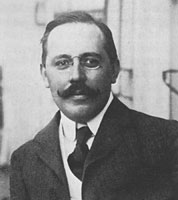Josef hoffmann
homes of the wittgensteins
JUNE 16–SEPTEMBER 2, 2002
Biography
Josef Hoffmann (1870-1956) was one of the premier Viennese proponents of the Gesamtkunstwerk, or "total work of art." A gifted and prolific designer of architecture, furniture, utensils, clothing, bookbindings, posters, textiles, and wallpaper, Hoffmann was convinced of the social and spiritual benefits of harmonious living environments designed by a single creative mind. Hoffmann was greatly influenced by John Ruskin, William Morris, Charles Robert Ashbee, and Otto Wagner, all of whom were dedicated to elevating the status of craft to that of fine art, and Hoffmann incorporated their teachings into the curriculum at the Kunstgewerbeschule (School for Arts and Crafts), where he was appointed professor at the age of twenty-nine. Hoffmann founded the Wiener Werkstätte in 1903 with fellow Vienna Secession member Koloman Moser. The Weiner Werkstätte aimed both to revive high standards of craftsmanship and to interest the broad public in cultivated and original design. Around 1900 Hoffmann developed his geometrically refined signature style, elegant and perfectly unified, that he incorporated in designs for silver, furniture, carpets, linens, and lamps in addition to architectural details. His aptitude for creating beautiful and timeless forms ensured that he enjoyed a career in building design and decoration, both in Europe and the United States, that lasted well into the 1950s.
Josef Hoffmann, c. 1903
Archives of the Weiner Werkstätte
MAK -- Austrian Museum for Applied Arts, Vienna

